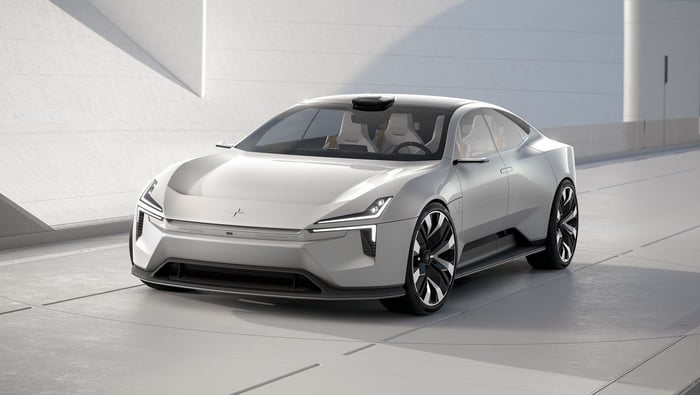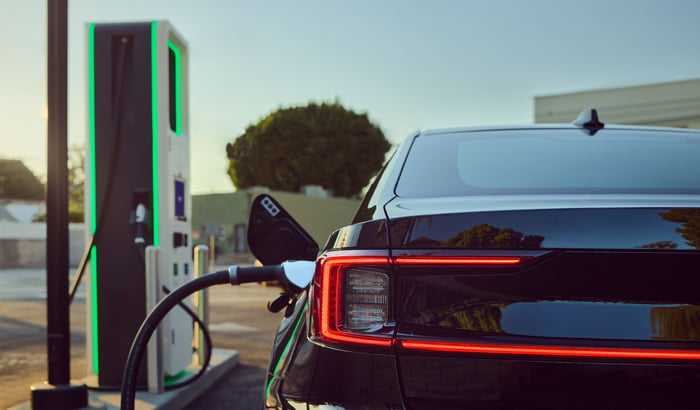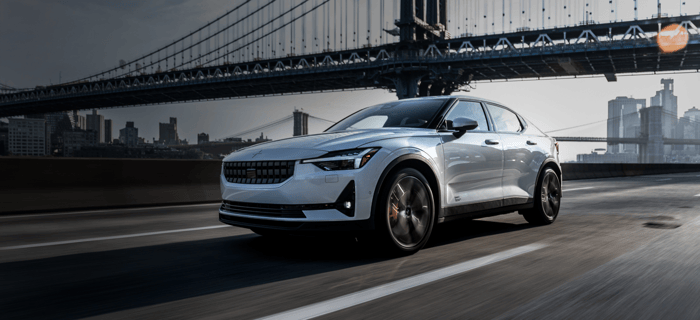Tesla (NASDAQ: TSLA) is the premier electric vehicle (EV) maker in the U.S. right now, selling more battery EVs than all other manufacturers combined. It has a 72% share of the total market.
Cox Automotive says that not only does it dominate the EV market, but Tesla also sold more luxury vehicles in the U.S. than Audi, BMW, Lexus, and Mercedes-Benz.
But the electric car market is getting more crowded, and Tesla had an 80% share of the market just one year prior. One of the newest entrants into the U.S. electric space is Polestar, a Swedish manufacturer backed by Volvo (OTC: VLVL.Y) that will soon be going public through a reverse merger with special purpose acquisition company (SPAC) Gores Guggenheim (NASDAQ: GGPI).

Image source: Polestar.
A luxury pedigree
Polestar got its start as Volvo's luxury EV nameplate whose Polestar 1 carries a $155,000 price tag. It began selling its newest EV, the $46,000 Polestar 2, in the U.S. earlier this year, making it a viable alternative to the Tesla 3, which has a base price of $42,700.
Although Tesla's stock is down 20% from its all-time high, it remains 80% above the low point it hit almost one year ago and is more than 1,700% higher than where it traded in 2019.
For investors who may feel they missed the greatest growth period of Tesla and wonder if Polestar could emulate that trajectory in terms of vehicle sales and stock price -- Gores Guggenheim shares stand only $1.89 above their $10 per share IPO offer price -- let's look at whether the EV upstart might be able to take on Tesla.

Image source: Polestar.
Revving its engine
Polestar's sales are taking off, with the EV maker reporting in January that it had "delivered on its global sales target of 29,000 vehicles in 2021, representing year-on-year growth exceeding 185%."
That came as a result of the number of markets it sells in expanding to 19 from 10 in 2021, while retail locations more than doubled to over 100. Polestar says it expects that number to grow to 150 by the end of 2022, and to be in at least 30 global markets by the end of 2023.
Tesla has a global footprint too, and its recently opened Berlin factory will allow it to more readily reach customers in Europe. However, Bloomberg is reporting that the Gigafactory will only produce 30,000 EVs this year instead of the expected 75,000, and it won't see a ramp-up in production until 2023 (the plant has the capacity to make 500,000 vehicles).
It's also seen production suspended for three weeks at its Shanghai facility as China locked down the region again over a COVID-19 outbreak -- a loss of about 40,000 vehicles produced -- and it's possible production could be suspended through May.
While even the reduced numbers exceed anything Polestar is doing, Tesla had over a decade to build up to those levels and Polestar is really just getting started.

Image source: Polestar.
Important industry backing
Polestar also has significant industry backing and support. Although Volvo is in competition with the luxury EV upstart, it is also an investor and will still be a part-owner of it following its reverse merger (Chinese automaker Geely owns Volvo Cars and will control a majority of Polestar's voting interests too).
Volvo's involvement has been, and will continue to be, important to Polestar's success. While its vehicles have been made previously at Geely's manufacturing plant in China (the plant is now owned by Volvo), it will have a second Volvo-owned facility in South Carolina where the new Polestar 3 SUV will be produced. Polestar is also using Volvo's service network for vehicle maintenance on its cars.
A deal with Alphabet to develop the world's first built-in Android-powered vehicle operating system for Polestar was signed through Volvo. Later this year, Qualcomm's Snapdragon Cockpit Platform will help power the system.
But Polestar is signing its own agreements now, such as those with ChargePoint (NYSE: CHPT) and Electrify America to provide charging stations for its vehicles, along with deals with Enterprise and Hertz to sell EVs to their rental fleets.
Stuck in a traffic jam
Yet as mentioned earlier, the EV market is becoming thick with competition -- not only from other pure-play EV manufacturers like Lucid and Rivian, but old line manufacturers such as Ford and General Motors and Polestar's former parent, Volvo, too.
While tax credits played a role in EV adoption early on, Tesla reached maturity on qualifying for them in 2018 and has not seen sales dented. It will still be a threat, but the Polestar 2 still qualifies for the full $7,500 credit, so its price will be much more competitive compared to Tesla.
Ultimately, there is still a large and growing market for EVs, especially as automakers such as Ford and GM promise to phase out gas-powered cars over time, and many European countries are mandating fossil fuel vehicles be eliminated. Yet with many manufacturers stepping into the void, it will be hard for any one company to stand out.
Can Polestar match Tesla's growth trajectory? I wouldn't count on it, even if Tesla's market share continues to erode. But that doesn't mean Polestar (through the Gores Guggenheim blank check company) can't still be a good bet on the electric vehicle future. Just don't expect it to follow that same meteoric path.
Find out why Tesla is one of the 10 best stocks to buy now
Our award-winning analyst team has spent more than a decade beating the market. After all, the newsletter they have run for over a decade, Motley Fool Stock Advisor, has tripled the market.*
They just revealed their ten top stock picks for investors to buy right now. Tesla is on the list -- but there are nine others you may be overlooking.
Click here to get access to the full list!
*Stock Advisor returns as of April 7, 2022
Suzanne Frey, an executive at Alphabet, is a member of The Motley Fool's board of directors. Rich Duprey has no position in any of the stocks mentioned. The Motley Fool owns and recommends Alphabet (A shares), Qualcomm, and Tesla. The Motley Fool recommends Alphabet (C shares). The Motley Fool has a disclosure policy.
The views and opinions expressed herein are the views and opinions of the author and do not necessarily reflect those of Nasdaq, Inc.


